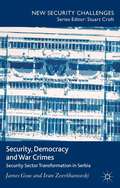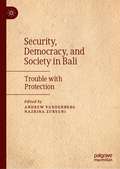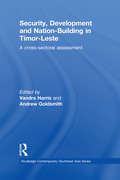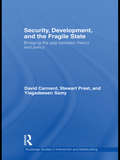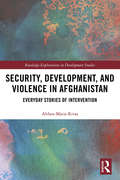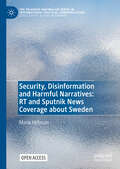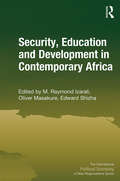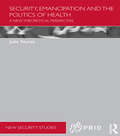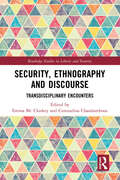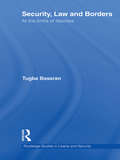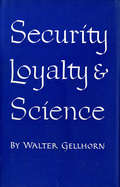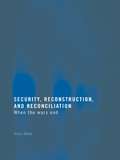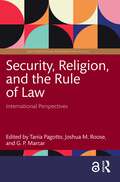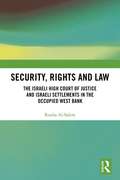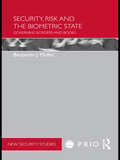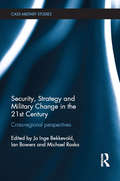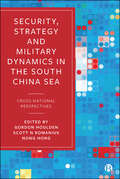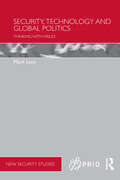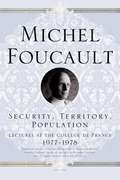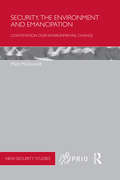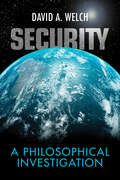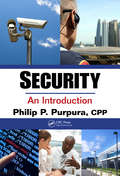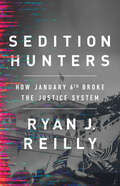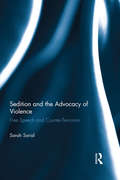- Table View
- List View
Security, Democracy and War Crimes
by James Gow Ivan ZveržhanovskiThis book examines how the war crime legacy resulting from the Yugoslav war of the 1990s on political and military transformation in Serbia was an impediment to security reform, democratization and the achievement of Western standards in the Belgrade armed forces. Using original empirical research, it traces the processes of restructuring, civilianisation, legal framework and democratic control and security policy communities, in relation to reforming the Serbian military. Crucially, the book focuses on the war crimes legacy from the 1990s, not as a matter of international conditionality, but as a key factor obstructing successful reform. This book, for the first time, examines the networks linked to security, intelligence and military agencies that protected war crimes suspects, such as General Ratko Mladic, delaying democratic control of the armed forces. Only when that network was broken, could the process of democratization begin to be complete. This unique book linking war crimes and security sector reform will appeal to scholars working on Serbia/former Yugoslavia, law and conflict, security and development, civil-military relations and Central and Eastern European politics.
Security, Democracy, and Society in Bali: Trouble with Protection
by Andrew Vandenberg Nazrina ZuryaniThis book focuses on how diverse developments are reflected in the rise of the security groups in Bali, Indonesia. Bali’s security groups pose many interesting questions. Why did they put up so many huge posters around the streets of southern Bali promoting themselves? Are their claims to represent the community plausible or are they “gangs”? How are they shaped by Indonesia’s violent past? How does Hinduism affect their gender politics? Do they promote illiberal populism or ethnic and religious tolerance? Does their central role in money politics prevent local democratization?Rather than write bottom-up history or bring the state back in, this collection as a whole draws on the ideas that circulate among leaders. These circulating ideas construct contemporary politics around both reinterpretations of old practices and responses to problems around tourism, gender, populism, religion, and democracy.
Security, Development and Nation-Building in Timor-Leste: A Cross-sectoral Assessment (Routledge Contemporary Southeast Asia Series)
by Andrew Goldsmith Vandra HarrisDespite Timor-Leste’s high expectations when it became independent from Indonesia in 2002, the country is ranked among the least developed countries in the world. It has found itself at the centre of international attention in the last decade, with one of the biggest interventions in UN history, as well as receiving amongst the highest per capita rates of bilateral assistance in the Asia-Pacific region. This book draws together the perspectives of practitioners, policy-makers and academics on the international efforts to rebuild one of the world’s newest nations. The contributors consider issues of peace-building, security and justice sector reform as well as human security in Timor-Leste, locating these in the broader context of building nation, stability and development. The book includes two demographic studies that can be used to critically examine the nation’s possible future. Engaging in deliberate consideration of both practical and theoretical complexities of international interventions, this book will be of interest to academics and students in the fields of Development, Security and Southeast Asian Studies.
Security, Development and the Fragile State: Bridging the Gap between Theory and Policy (Routledge Studies in Intervention and Statebuilding)
by David Carment Yiagadeesen Samy Stewart PrestThis book provides theoretical clarity about the concepts of failed and fragile states, which have emerged strongly since the 9/11 attacks. Recent contributions often see the fragile state as either a problem of development or of security. This volume argues that that neither perspective on its own is a sufficient basis for good policy. In a wide-ranging treatment, drawing on large samples as well as case studies, the authors create an alternative model of the fragile state emphasizing the multidimensional, multifaceted nature of the "fragile state problematique". On the basis of their model and empirical evidence, they then derive a number of policy-relevant insights regarding the need for contextualized and ongoing country analysis, the perils and pitfalls of unstructured development assistance, and the need to move whole-of-government approaches from the realm of rhetoric to reality. In offering both a synthesis of existing research and an innovative approach to understanding the fragile state, this volume will be of great interest to students of war and conflict studies, risk, conflict management, and international relations in general. It will also be of use to practitioners in policy circles and to NGOs.
Security, Development, and Violence in Afghanistan: Everyday Stories of Intervention (Routledge Explorations in Development Studies)
by Althea-Maria RivasSecurity, Development, and Violence in Afghanistan provides a unique insight into the lived realities of the international intervention in Afghanistan and highlights the diversity, relationships, and interdependence of various groups including both external actors and Afghan communities. Analysis of the international intervention in Afghanistan following the post 9/11 invasion in 2001, one of the largest and most expensive in history, tends to focus on the perspective of organisational dynamics and policies or external actors. Drawing on the author’s five years of experience living, researching and working in Afghanistan, this book uses ethnographic methodologies to explore the micro-level interactions between different actors, showing how communities, local leaders, aid workers, UN officials, military and others navigated shifting security, development, and conflict dynamics. Starting with a contextual introduction to the intervention and the key debates surrounding it, this book goes on to explore the stories of security, development, and violence as constructed through official policy discourse, and then through the lived experiences of interveners and local actors. The book weaves a compelling narrative which links local and global issues and focuses on the everyday practices, relationships and acts of resistance which take place in two provinces of Afghanistan. Finally, the author highlights what this book’s findings mean both for what we know about Afghanistan and for how we understand international interventions and the everyday dynamics between actors who live and work in spaces of conflict. Security, Development, and Violence in Afghanistan: Everyday Stories of Intervention will be of considerable interest to scholars and professionals with an interest in Afghanistan, aid work, humanitarian intervention, development studies, and peace and conflict studies.
Security, Disinformation and Harmful Narratives: RT and Sputnik News Coverage about Sweden (The Palgrave Macmillan Series in International Political Communication)
by Maria HellmanIt is a well-known fact both among scholars of propaganda and disinformation, and among political leaders that Sputnik and RT are using their news coverage for disinformation purposes to harm Western and European societies. Following the Russian invasion of Ukraine, which enhanced the security threat by disinformation, the EU decided to ban these two media. Against this backdrop, the study asks what the disinformation about Sweden in Sputnik and RT looked like prior to the ban (It should be noted that both channels still publish news for a European audience by way of VPN and other pathways.) It is done by way of a narrative approach, which means that the analyses seek to trace what stories that were told and how. The study thus analyzes the narrative logic of propaganda and disinformation narratives promulgated by Russian state-sponsored media platforms Sputnik and RT, and aim to show how these media have sought to denigrate Sweden. This is an open access book.
Security, Education and Development in Contemporary Africa (The International Political Economy of New Regionalisms Series)
by Edward Shizha Oliver Masakure M. IzaraliThis volume delineates the critical link among security, education and development in Africa and provides a multidisciplinary framework of analyses and possible solutions. Africa has had a long history that embodies layers of mass-scale criminality and exploitation not merely from neocolonial and apartheid policies but also from political greed. This has impacted adversely on security, education and development in a way that deprivation of education and underdevelopment, in turn, re-creates security issues. The volume aims firstly to help augment scholarly inquiry into the nexus among in/security, education and development through the multidisciplinary framework of analyses; secondly to provide policymakers and educators with tools and a framework to comprehend the complexity and magnitude of the issues to which they ought to be sensitive and respond; and finally to provide caregivers and childcare agencies of the state a comprehensible framework of underlying, multifaceted sources of trauma experienced by children in extraordinary circumstances. It is organized in four sections: theoretical conceptualization on security and development; country cases on security and development; security and educational development; and country cases on security and education. Serving as a significant compass to understand and respond to the complex interplay and impact of security, education and development in Africa, it is of great use to graduates and scholars interested in Africa Politics, IPE, security studies and development studies.
Security, Emancipation and the Politics of Health: A New Theoretical Perspective (PRIO New Security Studies)
by Joao NunesThis book develops a new theoretical framework for the study of security issues and applies this to the case of health. Building on the work of the ‘Welsh School’ of Security Studies, and drawing on contributions from the wider critical security literature, the book provides an emancipatory perspective on the health-security nexus – one which simultaneously teases out its underlying political assumptions, assesses its political effects and identifies potential for transformation. Security, Emancipation and the Politics of Health challenges conventional wisdom in the field of health and international politics by conceiving of health as a fundamentally political issue, and not merely as a medical problem demanding ‘technical’ solutions and arrangements. The book shows how political processes of representation underpin notions of health and disease through an examination of three key areas: the linkages between immigration and the fear of disease; colonial medicine; and the ‘health as a bridge for peace’ literature. In order to successfully carry out this political investigation of health, the book develops an innovative theoretical framework inspired by the idea of ‘security as emancipation’, which goes beyond the existing emancipatory literature in security studies. This book will be of much interest to students of critical security studies, health politics, sociology and IR in general.
Security, Ethnography and Discourse: Transdisciplinary Encounters (Routledge Studies in Liberty and Security)
by Emma Mc CluskeyThis interdisciplinary book analyses different contexts where security concerns have an impact on institutional or everyday practices and routines in the lives of ordinary people. Creating a dialogue between the fields of International Relations, Peace and Conflict Studies, Sociolinguistics, Education and Anthropology, this book addresses core themes associated with conflict and security – peacebuilding, refugee settlement, nationalism, surveillance and sousveillance – and examines them as they manifest in everyday spaces and practices. Seven empirical studies are presented that bring ethnographic and/or close-up interactional lenses to practices of security in schools, refugee centres, care homes, city streets and roadsides. Drawing on fieldwork and data from Cyprus, Bosnia-Herzegovina, Sweden, Germany and the US, the chapters explore what notions of suspicion, peace, conflict and threat mean and how they are manifested in people’s lived experiences. This book will be of much interest to students of Critical Security Studies, Anthropology, Sociology, Sociolinguistics and International Relations in general.
Security, Law and Borders: At the Limits of Liberties (Routledge Studies in Liberty and Security)
by Tugba BasaranThis book focuses on security practices, civil liberties and the politics of borders in liberal democracies. In the aftermath of 9/11, security practices and the denial of human rights and civil liberties are often portrayed as an exception to liberal rule, and seen as institutionally, legally and spatially distinct from the liberal state. Drawing upon detailed empirical studies from migration controls, such as the French waiting zone, Australian off-shore processing and US maritime interceptions, this study demonstrates that the limitation of liberties is not an anomaly of liberal rule, but embedded within the legal order of liberal democracies. The most ordinary, yet powerful way, of limiting liberties is the creation of legal identities, legal borders and legal spaces. It is the possibility of limiting liberties through liberal and democratic procedures that poses the key challenge to the protection of liberties. The book develops three inter-related arguments. First, it questions the discourse of exception that portrays liberal and illiberal rule as distinct ways of governing and scrutinizes liberal techniques for limiting liberties. Second, it highlights the space of government and argues for a change in perspective from territorial to legal borders, especially legal borders of policing and legal borders of rights. Third, it emphasizes the role of ordinary law for illiberal practices and argues that the legal order itself privileges policing powers and prevents access to liberties. This book will be of interest to students of critical security studies, social and political theory, political geography and legal studies, and IR in general.
Security, Loyalty, and Science (Cornell Studies in Civil Liberties)
by Walter GellhornBoth sides of a sensitive problem are assessed by Professor Gellhorn in this penetrating analysis of national security and its effect upon scientific progress.The costs and advantages of secrecy in certain areas of science and the conflict between national safety and individual rights in the administration of our federal loyalty program are presented; all the arguments are objectively weighed. The book answers such questions as: Can young scientists be well trained when publication and teaching are not free? Have we gone far enough-or too far-in avoiding "security risks" in important scientific establishments? How does the federal drive against "potentially disloyal" persons actually work? Do "fear of the smear" and crude methods discourage public service by American scientists?This study, a unit of an investigation of control of subversive activities supported by grants from the Rockefeller Foundation, is based upon two years of research and numerous field interviews of scientists, administrators, defense officials, and educators. Security, Loyalty, and Science is a volume in the series Cornell Studies in Civil Liberty, of which Robert E. Cushman is advisory editor.
Security, Reconstruction, and Reconciliation: When the Wars End
by Muna NduloThis key text brings together a team of leading contributors to address the complex issues of security reconciliation and reconstruction in post conflict societies. Security, Reconstruction and Reconciliation is organized into four main sections: the social, political, and economic dimensions of conflict the impact of conflict on women and children reconstruction and past human rights violations disarmament, demobilization, reintegration, post-war reconstruction and the building of a capable state and the role of the international community in the peace process. The chapters offer a detailed and succinct exposition of the challenges facing post conflict societies by articulating the vision of a new society. With a foreword by Francis Deng, the UN Secretary General’s Special Representative on Internally Displaced Persons, the authors discuss the issues in the context of possible solutions and lessons learnt in the field. This new book is a valuable resource for researchers, policy makers and students in the fields of conflict resolution, security studies, law and development.
Security, Religion, and the Rule of Law: International Perspectives (Routledge Studies in Religion and Politics)
by Joshua M. Roose Tania Pagotto G. P. MarcarSecurity, Religion, and the Rule of Law argues that true, substantive, and sustainable national security is only possible through respect for the rule of law, human rights, and religious freedom. Despite the emphasis on national security and the war on terror that has preoccupied governments for over two decades, nations – and the world – seem to be more divided than ever, with a concomitant impact of increasing the risk of terrorism and religious and political violence. The national security paradigm, previously reserved primarily for foreign threats, has been turned increasingly inwards, focusing on a state’s own citizens as potential threats. This is often along religious lines, threatening fundamental human freedoms. This book provides a series of critical engagements on some of the most pressing issues at the interface of religion and security today, including proposing a deeper engagement with theology when dealing with freedom of religious belief, exploring a better understanding between domestic peace and international relations, abiding by the rule of law while countering terrorism, and developing a broader understanding of identities and of the nature of citizenship. It provides the resources to further reflect upon and address these topics, as well as stimulate further discussions on religion and security matters across a range of different disciplines. Wide-ranging case studies consider Australia, China, Europe, the Kurdish people, Nigeria, Russia, Ukraine, the United Nations, and the United States. This book will appeal to students and scholars across a range of disciplines, including international relations, law, philosophy, political science, religious studies, security studies, and theology. It will also appeal to human rights lawyers, judges, NGO researchers, governmental agency specialists, and policy makers.
Security, Religion, and the Rule of Law: International Perspectives (Routledge Studies in Religion and Politics)
by Joshua M. Roose Tania Pagotto G. P. MarcarSecurity, Religion, and the Rule of Law argues that true, substantive, and sustainable national security is only possible through respect for the rule of law, human rights, and religious freedom.Despite the emphasis on national security and the war on terror that has preoccupied governments for over two decades, nations – and the world – seem to be more divided than ever, with a concomitant impact of increasing the risk of terrorism and religious and political violence. The national security paradigm, previously reserved primarily for foreign threats, has been turned increasingly inwards, focusing on a state’s own citizens as potential threats. This is often along religious lines, threatening fundamental human freedoms. This book provides a series of critical engagements on some of the most pressing issues at the interface of religion and security today, including proposing a deeper engagement with theology when dealing with freedom of religious belief, exploring a better understanding between domestic peace and international relations, abiding by the rule of law while countering terrorism, and developing a broader understanding of identities and of the nature of citizenship. It provides the resources to further reflect upon and address these topics, as well as stimulate further discussions on religion and security matters across a range of different disciplines. Wide-ranging case studies consider Australia, China, Europe, the Kurdish people, Nigeria, Russia, Ukraine, the United Nations, and the United States.This book will appeal to students and scholars across a range of disciplines, including international relations, law, philosophy, political science, religious studies, security studies, and theology. It will also appeal to human rights lawyers, judges, NGO researchers, governmental agency specialists, and policy makers.Chapter 5 of this book is freely available as a downloadable Open Access PDF at http://www.taylorfrancis.com under a Creative Commons Attribution-Non Commercial-No Derivatives (CC-BY-NC-ND) 4.0 license.
Security, Rights and Law: The Israeli High Court of Justice and Israeli Settlements in the Occupied West Bank (Comparative Constitutionalism in Muslim Majority States)
by Rouba Al-SalemThis book examines how the Israeli High Court of Justice (HCJ) has interpreted and applied international law principles in adjudicating petitions filed by Palestinians. The research focuses on HCJ judgments that have been rendered since the outbreak of the Second Intifada (2000) in relation to petitions challenging the legality of measures implemented by various Israeli governments and military authorities for the professed need of enhancing the security of Israeli settlements and settlers in the occupied West Bank. It discusses to what extent the HCJ provides a venue for an effective domestic remedy for alleged violations of the Palestinians’ internationally protected rights. It further analyses the judgments of the Court seeking to demonstrate why it appears to show a preference for invoking principles of Israeli administrative and constitutional law, thereby promoting the domestic rather than international Rule of Law. Although the jurisprudence of the HCJ has often been hailed as that of an ‘activist’ court, the analysis of petitions adjudicated by the Court between 2000 and 2014 illustrates why its approach is ill-suited to a situation of prolonged military occupation. Finally, the book evaluates what impact the Court’s adjudication, reasoning and interpretation has on the normative coherence of the international law of belligerent occupation.
Security, Risk and the Biometric State: Governing Borders and Bodies (PRIO New Security Studies)
by Benjamin J MullerThis book examines a series of questions associated with the increasing application and implications of biometrics in contemporary everyday life. In the wake of the events of 9/11, the reliance on increasingly sophisticated and invasive technologies across a burgeoning field of applications has accelerated, giving rise to the term 'biometric state'. This book explores how these ‘virtual borders’ are created and the effect they have upon the politics of citizenship and immigration, especially how they contribute to the treatment of citizens as suspects. Finally and most importantly, this text argues that the rationale of 'governing through risk' facilitates pre-emptory logics, a negligent attitude towards 'false positives', and an overall proliferation of borders and ubiquitous risk, which becomes integral to contemporary everyday life, far beyond the confined politics of national borders and frontiers. By focusing on specific sites, such as virtual borders in airports, trusted traveller programs like the NEXUS program and those delivered by airlines and supported by governmental authorities (TSA and CATSA respectively), this book raises critical questions about the emerging biometric state and its commitment and constitution vis-à-vis technology of ‘governing through risk’. This book will be of interest to students of biopolitics, critical security, surveillance studies and International Relations in general. Benjamin J. Muller is assistant professor in International Relations at Simon Fraser University, Burnaby, Canada. He completed his PhD in the School of Politics and International Studies at Queen’s University Belfast, Northern Ireland, in 2005.
Security, Strategy and Military Change in the 21st Century: Cross-Regional Perspectives (Cass Military Studies)
by Jo Inge Bekkevold Ian Bowers Michael RaskaThis edited volume explores and analyses strategic thinking, military reform and adaptation in an era of Asian growth, European austerity and US rebalancing. A significant shift in policy, strategy and military affairs is underway in both Asia and Europe, with the former gaining increasing prominence in the domain of global security. At the same time, the world’s powers are now faced with an array of diverse challenges. The resurgence of great power politics in both Europe and Asia, along with the long term threats of terrorism, piracy and sustained geopolitical instability has placed great strain on militaries and security institutions operating with constrained budgets and wary public support. The volume covers a wide range of case studies, including the transformation of China’s military in the 21st century, the internal and external challenges facing India, Russia’s military modernization program and the USA’s reassessment of its strategic interests. In doing so, the book provides the reader with the opportunity to conceptualize how strategic thinking, military reform, operational adaptation and technological integration have interacted with the challenges outlined above. With contributions by leading scholars and practitioners from Europe and Asia, this book provides a valuable contribution to the understanding of strategic and operational thinking and adjustment across the world. This book will be of much interest to students of military and strategic studies, security studies, defence studies, Asian politics, Russian politics, US foreign policy and IR in general.
Security, Strategy, and Military Dynamics in the South China Sea: Cross-National Perspectives
by Gordon Houlden, Scott N. Romaniuk, and Nong HongThis volume brings together international experts to provide fresh perspectives on geopolitical concerns in the South China Sea. The book considers the interests and security strategies of each of the nations with a claim to ownership and jurisdiction in the Sea. Examining contexts including the region’s natural resources and China’s behaviour, the book also assesses the motivations and approaches of other states in Asia and further afield. This is an accessible, even-handed and comprehensive examination of current and future rivalries and challenges in one of the most strategically important and militarized maritime regions of the world.
Security, Technology and Global Politics: Thinking with Virilio (PRIO New Security Studies)
by Mark LacyThis book analyses some of the key problems explored in Paul Virilio’s theorising on war and security. Paul Virilio has developed a provocative series of writings on how modern societies have shaped the acceleration of military/security technologies – and how technologies of security and acceleration have transformed society, economy and politics. His examination of the connections between geopolitics, war, speed, technology and control are viewed as some of the most challenging and disturbing interventions on the politics of security in the twenty-first century, interventions that help us understand a world that confronts problems that increasingly emerge from the desire to make life safer, faster, networked and more efficient. Security, Technology and Global Politics examines some of the key concepts and concerns in Virilio’s writings on security, society and technology: endo-colonization, fear and the war on terror; cities and panic; cinema and war; ecological security and integral accidents; universities and ideas of progress. Critics often point to an apocalyptic or fatalistic element to Virilio’s writings on global politics, but this book challenges this apocalyptic reading of Virilio’s work, suggesting that – while he doesn’t provide us with easy solutions to the problems we face – the political force in Virilio’s work comes from the questions he leaves us with about speed, security and global politics in times of crisis, terror and fear. This book will be of interest to students of critical security studies, political theory, sociology, political geography, cultural studies and IR in general.
Security, Territory, Population: Lectures At The College De France, 1977-1978
by Michel FoucaultMarking a major development in Foucault's thinking, this book takes as its starting point the notion of "biopower," studying the foundations of this new technology of power over populations.
Security, the Environment and Emancipation: Contestation over Environmental Change (PRIO New Security Studies)
by Matt McDonaldThis book offers an examination of the role of emancipation in the study and practice of security, focusing on the issue of environmental change. The end of the Cold War created a context in which traditional approaches to security could be systematically questioned. This period also saw a concerted attempt in IR to argue that environmental change constituted a threat to security. This book argues that such a notion is problematic as it suggests that a universal definition of security is possible, which prevents a recognition of security as a site of contestation, in which a range of actors articulate alternative visions of who or what is in need of being secured. If security is understood and approached in traditional terms - as the territorial preservation of the nation-state from external threat - then it is indeed difficult to see how environmental issues would benefit from being placed on states’ security agenda. If, however, security is defined in terms of the emancipation of the most vulnerable individuals from contingent structural oppressions, then drawing a relationship between environmental change and security may be beneficial for redressing those environmental issues and prioritising the needs of those most at risk from the manifestations of global environmental change. This book takes the limitations of contemporary approaches to the relationship between the environment and security as its starting point, and seeks to do two things. First, it aims to illustrate the ways in which arguments over approaches to environmental issues can be viewed as contestation over the meaning of 'security‘ in particular political contexts. Central here is the composition and assumptions of the dominant security discourse to emerge regarding those issues: a framework of meaning for the most important forms of action on behalf of a particular group, defining the terms for meaningful contestation and negotiation about security itself within that group. As such, the book attempts to illustrate the dynamics of competition over the meaning of security with reference to environmental issues, particularly focusing on instances of political change in the dominant security discourse through which that issue is approached. In the process the author points to the central role of these dominant security discourses in underpinning the most practically significant actions regarding environmental issues such as deforestation and global climate change. The book employs methodological tools that enable a focus on how particular frameworks of meaning are constituted and become dominant; how they provide a lens through which various issues are approached; and how discourses most consistent with redressing environmental change and the suffering of the most vulnerable might come to provide the framework through which security is viewed in particular contexts. This book will be of much interest to students of Critical Security Studies, geography, sociology, IR and Political Science in general.
Security: A Philosophical Investigation
by David A. WelchHow do we know when we are investing wisely in security? Answering this question requires investigating what things are worth securing (and why); what threatens them; how best to protect them; and how to think about it. Is it possible to protect them? How best go about protecting them? What trade-offs are involved in allocating resources to security problems? This book responds to these questions by stripping down our preconceptions and rebuilding an understanding of security from the ground up on the basis of a common-sense ontology and an explicit theory of value. It argues for a clear distinction between objective and subjective security threats, a non-anthropocentric understanding of security, and a particular hierarchy of security referents, looking closely at four in particular-the ecosphere, the state, culture, and individual human beings. The analysis will be of interest not only to students and scholars of International Relations, but also to practitioners.
Security: An Introduction
by Philip P. PurpuraToday, threats to the security of an organization can come from a variety of sources- from outside espionage to disgruntled employees and internet risks to utility failure. Reflecting the diverse and specialized nature of the security industry, Security: An Introduction provides an up-to-date treatment of a topic that has become increasingly comple
Sedition Hunters: How January 6th Broke the Justice System
by Ryan J. ReillyThe January 6th attack is an unprecedented crime in American history. Sprawling and openly political, it can't be handled by the traditional rules and norms of law enforcement--threatening the very idea of justice and its role in society. The attack on the Capitol building following the 2020 election was an extraordinarily large and brazen crime. Conspiracies were formed on social media in full public view, the law-breakers paraded on national television with undisguised faces, and with outgoing President Donald Trump openly cheering them on. The basic concept of law enforcement--investigators find criminals and serve justice--quickly breaks down in the face of such an event. The system has been strained by the sheer volume of criminals and the widespread perception that what they did wasn't wrong. A mass of online tipsters--"sedition hunters"--have mobilized, simultaneously providing the FBI with valuable intelligence and creating an ethical dilemma. Who gets to serve justice? How can law enforcement still function as a pillar of civil society? As the foundations of our government are questioned, the FBI and Department of Justice are the first responders to a crisis of democracy and law that threatens to spread, and fast. In this work of extraordinary reportage, Ryan Reilly gets to know would-be revolutionaries, obsessive online sleuths, and FBI agents, and shines a light on a justice system that's straining to maintain order in our polarized country. From the moment the police barriers were breached on January 6th, 2021, Americans knew something had profoundly changed. Sedition Hunters is the fascinating, high-stakes story of what happens next.
Sedition and the Advocacy of Violence: Free Speech and Counter-Terrorism
by Sarah SorialThis book employs the theoretical framework of ‘speech act theory’ to analyse current legislative frameworks and cases pertaining to sedition or the advocacy of violence and the issue of freedom of speech. An analysis of the relation between speech and action offers a promising way of clarifying confusion over the contested status of speech, which advocates violence as a political strategy. This account reflects an understanding of philosophical issues about both the nature of freedom and speech and how these issues can be applied to concrete legal problems. This approach will shed new light on the problems of the sedition laws and how they might be remedied by providing a conceptual account of the nature of speech and its relation to action. On the basis of J.L Austin’s account of verdictive and exercitive speech acts, it is argued that while all speech acts are ‘conduct’ in a narrow sense, not all of them have the power to produce effects. This philosophical account will have legal consequences for how we classify speech acts deemed to be dangerous, or to cause harm. It also suggests that because speech can evoke or constitute action or conduct in certain circumstances, modern versions of sedition laws might in principle be defensible, but not in their current form. On the basis of this account, it is argued that the harms caused or constituted by speech can be located in the authority of the speaker. Sedition and Violence Against the State: Free Speech and Counter-Terrorism will be of interest to students and scholars of philosophy of law and legal theory.
